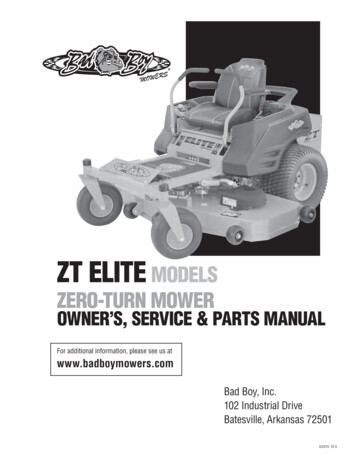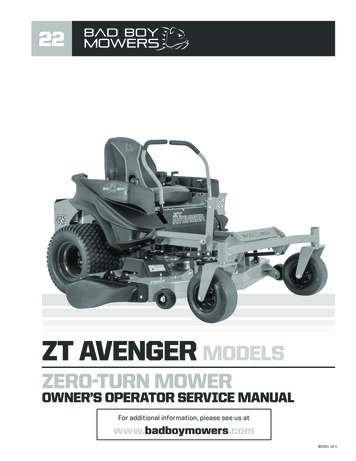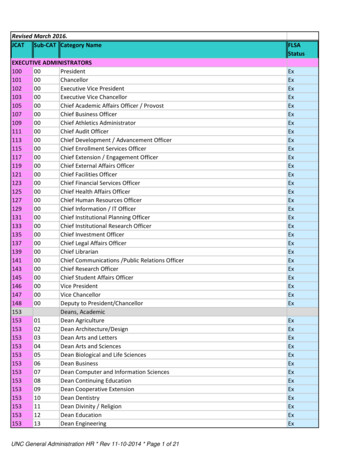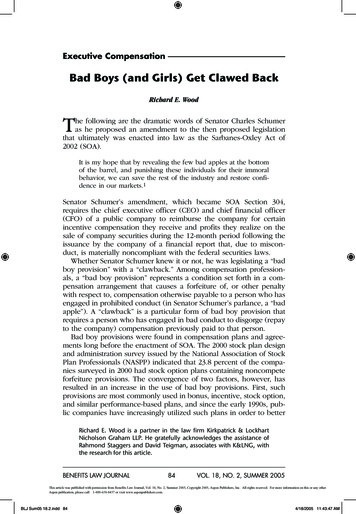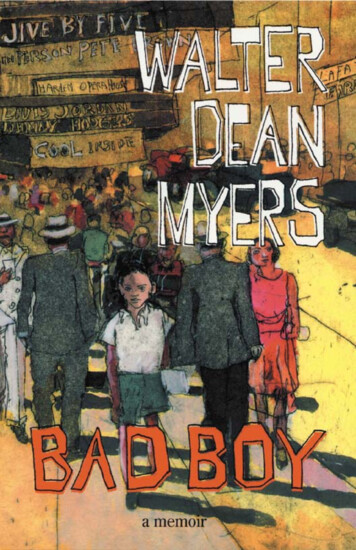
Transcription
0101010101a memoir0101A0101010101
For Karen, Michael, and Christopher
ContentsRootsHarlemLet’s Hear It for the First Grade!Arithmetic SummerBad BoyMr. Irwin LasherI Am Not the Center of the UniverseA Writer Obser vesSonnets from the PortugueseHeady Days at Stuyvesant HighThe Garment CenterGod and Dylan ThomasMarks on PaperThe StrangerDr. HolidayBeing Black1954Sweet SixteenThe TypistBooks I’ve TypedAbout the AuthorOther Books by Walter Dean MyersCreditsCoverCopyrightAbout the 88199207
RootsEach of us is born with a history already in place.There are physical aspects that make us brown-eyedor blue-eyed, that make us tall or not so tall, or giveus curly or straight hair. Our parents might be rich orpoor. We could be born in a crowded, bustling city orin a rural area. While we live our own individual lives,what has gone before us, our history, always has someeffect on us. In thinking about what influenced myown life, I began by considering the events andpeople who came before me. I learned about most ofthe people who had some effect on my life throughfamily stories, census records, old photographs, and,in the case of Lucas D. Dennis, the records of theWorks Progress Administration at the University ofWest Virginia. 1
The Works Progress Administration was a government program formed to create jobs during theDepression years. It did this by starting a number ofprojects, including state histories. Among the notes ofthe interviewers putting together a history of WestVirginia, I came across this entry.Life of a SlaveLucas D. Dennis was one of the one hundred and fiftyslaves that Steve Dandridge owned before the Civil War.This slave is ninety-four years old. He was born inJefferson County. His mind is very bright, he still has twoof his own teeth, his hair is gray and [he] wears a heavybeard which is also gray.After the Civil War he came to Harpers Ferry and builthimself a house, which is on one of the camping groundsused during the war. This house is on Filmore Ave. andthe corner of a lane leading to where many soldiers wereburied and later taken up and carried to their burialground in Winchester.He lives with his wife, she is eighty-four. He saw JohnBrown and remembers well the day he was hanged.Lucas D. Dennis was my great-great-uncle. Priorto the Civil War, when West Virginia was still part ofthe state of Virginia, these ancestors of mine wereslaves on a plantation called The Bower, in Leetown,Virginia. The 1870 census still listed Lucas D. Dennis 2
as living on the plantation, but I knew, from familystories, that he did indeed move to Harpers Ferry andthat part of the Dennis family moved to Martinsburg,West Virginia, less than ten miles from The Bower. Atthe time of the interview with Lucas D. Dennis, theDennis family in Martinsburg had merged with theGreen family. One of the women of the Green family,Mary Dolly Green, later became my mother.I have no memory of Mary Dolly Green. I knowthat she gave birth to me on a Thursday, the twelfth ofAugust, 1937. I have been told that she was tall, witha fair complexion. Mary had five children: Gertrude,Ethel, George, me, and Imogene. Shortly after the birthof my sister Imogene my mother died, leaving myfather, George Myers, with seven children, two of them,Geraldine and Viola, from a previous marriage. When Iimagine my mother, I think of an attractive youngwoman with the same wide smile as my sisters’. I wishI could have known her. However, today, when I thinkof “mother,” I think of another woman, my father’s firstwife, Florence Dean.Florence Dean’s mother emigrated from Germanyin the late 1800s. A cook by profession, Mary Gearhartsettled outside Chambersburg, Pennsylvania, in NewFranklin, Pennsylvania. There she met and married aNative American by the name of Brown. The couple 3
had one daughter, Florence. Mary Gearhart, a small,pleasant woman, worked at a number of restaurantsbefore finding a job in a German hotel in Martinsburg,West Virginia.When Florence was old enough to work, she alsocame to Martinsburg. It was while working at thehotel that she met a young black man, George Myers.The two young people began to see each other sociallyand were married when Florence was seventeen.From this marriage came two children, Geraldine andViola. Unfortunately, the marriage ended in divorce,and Florence returned to Pennsylvania. The fact thatFlorence had married a black man did not sit well withher German relatives, and she was made to feel unwelcome. She decided to move to Baltimore, Maryland,where she met Herbert Dean.Herbert Dean lived in Baltimore with his father,stepmother, two sisters, Nancy and Hazel, and hisbrother, Leroy. His father, William Dean, was a tall,handsome, and opinionated man who had little use forformal education aside from reading the Bible, andeven less use for women. He ran a small hauling business in Baltimore that consisted of several wagons andteams of horses. He expected his sons to enter thebusiness when they were of age. When trucks beganto replace horses and wagons, he scoffed at the idea, 4
labeling the trucks as a mere fad that would never last.Even as his business declined, he stubbornly stuck tohis beliefs. By the time he was nine, Herbert Dean wasalready working, pulling a wagon through the streetsof the city, collecting scraps of wood, cutting it for kindling, and selling it door to door to light the fires in theold coal stoves that most people had at the time.Herbert had left school after the third grade, realizingthat he was needed to help support the family.By the time Herbert reached manhood, his father’shauling business was no more than a way of making afew dollars on occasion, and when William Dean stilldeclined to invest in trucks, both of the boys struck outon their own. Leroy decided to remain in the Baltimorearea, and Herbert decided to try his luck in New YorkCity. Herbert had met a woman who interested him.She had been married previously and had two children,but now she was single and still quite attractive. Thewoman, Florence, was white, and that posed a problemin Baltimore. Perhaps, Herbert thought, it would beless of a problem in New York.Herbert and Florence married and moved toHarlem. Herbert first found work with a moving company owned by the gangster Dutch Schultz. Eachmorning, men would line up on the street corners, andthe Schultz trucks would pick up as many men as they 5
needed that day. When Schultz was not hiring, therewere occasional jobs to be had at the docks, loading andunloading ships. Eventually, Herbert found a permanent job as a janitor with the United States RadiumCorporation in downtown New York.As a young couple Herbert and Florence made theHarlem party scene. When Herbert’s boyhood friendChick Webb came to New York, he introduced Herbertto some of his show-business pals such as Bill Robinsonand Fats Waller. Herbert even entertained the idea ofgetting into music and bought a slide trombone at apawnshop. Florence hated the trombone, disliked jazz,and wanted to be reunited with her daughters, whowere still living in Martinsburg with their father.Herbert agreed to bring Florence’s two daughters, Geraldine and Viola, to New York and drove downto Martinsburg in the black Ford he had bought. It wasduring this visit that he met George Myers, Florence’sfirst husband, her two daughters, and George’s children by Mary Myers.The girls were brought to Harlem, and severalmonths later it was decided that Herbert and Florencewould also take the youngest boy, Walter Milton Myers. 6
HarlemHarlem is the first place called “home” that I canremember. It was a magical place, alive with musicthat spilled onto the busy streets from tenement windows and full of colors and smells that filled my sensesand made my heart beat faster. The earliest memory Ihave is of a woman who picked me up on Sunday mornings to take me to Sunday school. She would have fiveto ten children with her when she rang our bell on126th Street, and we would go through the streetsholding hands and singing “Jesus Loves Me” on ourway to Abyssinian Baptist. I remember being comforted by the fact that Jesus, whom I didn’t even know,thought so much of me. After church we would bebrought home, again holding hands and singing ourway through the streets of Harlem. 7
What life was about for me in those early yearswas being with the woman I was learning to call Mama.When Florence Dean was home, I would follow herfrom room to room as she cleaned, talking about anything that came to mind, knowing that she wouldalways listen. Any house in which she lived was keptspotless. Mama had a time to sweep the floors and atime to mop them. There was a time to wash clothesand a time to iron them, fold them, and put them away.Each holiday meant taking all the dishes down fromthe shelves, even the ones we never used, and carefullywashing and drying them, as well as the windows ofthe dish cabinet.Mama didn’t work outside the house when I firstarrived in New York, but that changed from time totime. I remember that when I was four, a woman in thebuilding was taken on as my caretaker during the dayswhen Mama worked. Mama did what she called “day’swork,” meaning that she cleaned other people’s apartments and was paid by the day. The woman who tookcare of me gave that chore to her children, who delightedin torturing me by hiding in the closet and makingbelieve they were ghosts. I was a bawler, screaming infear at all the appropriate moments, which delightedthem. I learned how mindlessly cruel some childrencould be. 8
We were far away from credit cards in those days,and the equivalent was an account at the corner grocery. Mama, who was determined that I should neverbe hungry, arranged with the grocer to give me food ifI was hungry and to put it on her account. What I actually did when I had the chance was buy penny squaresof chocolate. Soon every kid on the block knew that Icould get “free” chocolates. One weekend both thegrocer and I got a good talking-to, and my account cameto a crashing end.What I loved most about Harlem, though, was themusic. There were radios everywhere, and little girlsjumped double Dutch to Duke Ellington, Cab Calloway,and Glenn Miller. My sisters, Gerry and Viola, dancedwith me in the house, but the girls in the street wouldn’tdance with me, so I danced by myself. I had taughtmyself a little dance that I called “the boogie.” Mydancing was amusing enough for people to throw pennies to me when I danced. When I had enough pennies,I would scoop them up and run to the grocer’s to buymy favorite colored icy pops. I could keep this up forhours and loved it until one day I had a stomachacheand went home crying. When Mama got home fromwork, she put me on the toilet and sat on the edge ofthe bathtub to comfort me. Within minutes I was beingsnatched up and rushed to Knickerbocker Hospital. 9
Mama had reasoned that the red liquid passingthrough my intestines had to be blood. At the hospitalthe doctors were equally alarmed until a few tests confirmed that I had consumed so many icy pops that thefood coloring was going straight through. It was clearI needed more supervision during the day, and Mamafound another baby-sitter, who took care of a numberof children.This woman had playground apparatus in herbackyard, which I liked a lot. I was told not to play onthe climbing bars, but I tried them anyway. Getting tothe top was easy enough and not nearly as excitingas falling off, headfirst, onto the cement below. I’vealways had a big head, and I must have looked a sightthat night, with bandages covering half my face, whenMama picked me up. She decided to stay home to takecare of me for a while.My two sisters were already in their teens and hadthe job of being young ladies. I was the baby of thefamily and the only boy and got most of the attention,which I enjoyed. I claimed Mama for my own and wasjealous of any attention she paid to her daughters.When Gerry received a fancy watch as a present, I wasannoyed. Gerry hadn’t changed, and so I thought it wasthe watch that made her special.“Can I have a nickel?” I asked Mama. A week had 10
passed since Gerry had received the watch, and Mama,her forehead dripping sweat, was doing the wash in atub of scalding water, pushing the sheets down into thehot liquid with a stick. Mama shook her head.“Can I have a nickel?” I asked again, wanting herto stop the washing and perhaps take me to the cornerstore for an icy pop.“Later, Walter,” she said. “I’m busy now. Go play.”“I’ll break Gerry’s watch,” I said.“Boy, go into the living room and play!” she said,sternly.The watch didn’t break right away. I hit it with myshoe, and nothing happened. Then I hit it with myfather’s shoe, and it still didn’t break. Then I hit it withboth shoes as hard as I could until I saw a crack in thecurved crystal. This I took proudly to Mama.A spanking is a spanking is a spanking. Mama wasstrong enough to hold me by the corner of my shirt atthe shoulder and lift me so that I could not get a firmfooting on the ground. Then, still sweating from herefforts at washing the sheets, she laced into me with afolded belt that, from that time on, became “the strap.”Of course, she could have prevented the watch frombeing broken if she had only believed me when I toldher that I was going to break it. Instead she coveredmy legs and hands with welts with the strap. When 11
Gerry came home from work, she wasn’t pleased,either.I needed discipline, but my adoptive father,Herbert Dean, hated to see me crying. So the nexttime Mama worked outside the house, I was sent to myaunt Nancy, my father’s sister, who lived in downtownNew York.Division Street on New York’s Lower East Sidewas as wonderful to me as Harlem. There were fewblack people in the area, but at my age, which wasprobably five, I was not really aware of racial differences. What was on Division Street was Aunt Nancy,her husband, whom we all called Mr. Harrison, thebakery she operated, pushcarts, a matzoh factory, andJewish boys. Mama would take me to Aunt Nancy’s ona Sunday night and pick me up the following Friday.Aunt Nancy was as fat as she was tall. She was thebiggest woman I had ever seen in my life and exactlythe same color brown as my father. I liked her becauseshe was a friendly woman, but I absolutely hated theidea that she would take naps in the middle of the day.What’s more, she would insist that I take naps withher, which I thought was a terrible thing to do. I neverwanted to go to sleep, not even at night when it wasdark. Certainly I didn’t want to go to sleep in themiddle of the day. Still, every afternoon she would 12
come upstairs from the bakery and head for the bed.In Aunt Nancy’s living room was a cast-iron alligator ashtray that was nearly as tall as I was. It hadglass eyes and hard cast-iron scales down its back.More than once I thought I saw one of its glass eyeslook in my direction. It was not my favorite object.Aunt Nancy spent most of the day working in thebakery. In the afternoons I was allowed to play in frontof the store. That’s where I met the boys who told mewe could beat up some of the Jewish boys.The Jewish boys always came downstairs withtheir mothers. They wore their hair long on the sideand sometimes wore shirts that seemed too big. If youhit them, they wouldn’t hit back but would run to theirmothers. I followed the example of some of the biggerboys and hit the ones who wouldn’t hit back. The problem was, of course, that if you chased them around thecorner, where their mothers couldn’t see them, theywould fight back. After a while a Jewish boy wouldstand near the corner, hoping that one of us wouldmake the mistake of chasing him to a position where hecould send his fist into an unsuspecting nose. If themen who worked in the matzoh factory saw us, theysometimes would separate us and give everyone hotbaked matzohs. Wonderful.Mama didn’t always have to work outside the 13
house. The greatest time I ever spent in my life waswhen she was home. During the day we would walkdown the south side of 125th Street to the SmilenBrothers produce store or to Blumstein’s, the largeststore on 125th Street. The street was always busy,and black and white shoppers stopped in the shoestores or bought charlotte russes to eat as theywalked. We would walk east and then return on thenorth side of the street. The north side of the streethad Herbert’s Diamonds, a large jewelry store, andthe better theaters. First we would stop at the RKOAlhambra to see what was playing, then the Loew’s.Sometimes Mama would stop and look at the picturesoutside the Apollo Theater, and sometimes, for a special treat, we would stop in the penny arcade. On rareoccasions we would go all the way over to the EastSide to the market stalls under the elevated railroadtracks.If we didn’t go out, we would listen to her soapoperas on the radio. Helen Trent was her favorite.Mama also liked to read True Romance magazines andwould let me sit on her lap as she read aloud.The sound of Mama’s voice in our sun-drenchedHarlem kitchen was like a special kind of music, meantfor only me. It was almost a secret language, one thatonly the two of us understood. I don’t think she ever 14
used that special voice with my sisters or my father.She was small, barely over five feet tall, and I was soontoo big to sit on her lap. Then she would sit at thekitchen table, and I would sit on a chair with woodenarms and a fabric body that I loved and listen to thesound of her voice as she half read, half acted out thestories of lost loves and sudden passions.I think she liked talking to me. She could tell methings she wouldn’t tell other people. Once she told methat she liked to yodel and that she had done so as achild. She yodeled for me, and I thought it was marvelous. When I told my father, he laughed, and shewouldn’t yodel for him. Sometimes she would ask mesimple questions, like what did I think the weatherwould be the next day, and stop whatever she wasdoing and wait for an answer. I would have the wordsin my head and would try to get them out as quickly asI could, putting them in as good an order as I could.“Why don’t you just marry Mama?” my sisterViola complained. “You always have something to sayto her.”I asked Mama about that later, and she said no, shealready had a husband, Herbert.Years later, when I had learned to use wordsbetter, I lost my ability to speak so freely with Mama.I didn’t want to learn to read so much as I wanted 15
to be like Mama. I liked words and talking, and Iwanted to be able to look at the magazines and tell herthe stories as she did for me. I told her that I wantedto do this, and she rearranged our chairs so we weresitting side by side in the kitchen, with her pointing outthe words as she read them. Slowly, with Mama’s help,I learned to read. Before long I could read well enoughto read to Mama as she did the housework. What wehad to read were Mama’s True Romance magazines anda few Classic comics. I didn’t understand much of whatI was reading, but I was on my way. 16
Let’s Hear It for the FirstWhen I first started school, I could read on a second-grade level, and it was suggested that I be put intothat grade. I was as big as most second graders, too.My first-grade teacher, Mrs. Dworkin, said that it wasa very bad idea.“He can read on the second-grade level, but hecan’t speak well enough to be in the second grade.”I didn’t know what she meant by that because Ithought I spoke perfectly well. But I liked Mrs.Dworkin. She was a hugger, and whenever you didsomething good in her class, it ended up with herpulling you close and telling you just how good youwere. I was in no hurry to leave her class.We used a thick white paste to glue leaves andpicture cutouts onto heavy construction paper. My 17
only trouble in the first grade came when I accidentally dumped a jar of the paste onto my lap. A boylaughed, and I took some of the paste from my lapand put it on his. Mrs. Dworkin made me stand in acorner for almost an hour. Despite the “accident,” Iloved P.S. 125, and I loved school. It was a place whereI could meet a lot of other kids my age, play games,and listen to the stories that Mrs. Dworkin would readto us. It wasn’t until I reached the second grade thatI realized that I had a speech problem.“Dabba! Dabba! Dabba!” Manuel Bonilla tauntedme, standing inches from my face and mimicking mypoor speech as the rest of the class watched. “Dabba!Dabba! Dabba!”Manuel stopped the “dabba-dabba-dabba” when Ihit him in the face. When Mrs. Bower, our secondgrade teacher, came into the room, the class was standing around Manuel, who lay still on the floor.“Is he dead?” someone asked.Of course Manuel wasn’t anywhere near dead, butthat didn’t stop Mrs. Bower from sending me directlyto the principal’s office. Again.Actually, I liked the principal’s office. It was interesting to see the teachers come and go, talking aboutwhat they would have for lunch or what they had donethe night before just as if they were normal people. 18
I liked Mrs. Flynn, the principal, too. She was a tall,elegant woman who had a way of talking to pupils thatmade you feel good about yourself even if you werebeing punished.My punishment, on this occasion, was to write fivehundred times, “I will never, never hit any student inPublic School 125.”Public School 125 on LaSalle Street had once beena police station. There were rumors of cells in the basement where the souls of dead prisoners, prisoners whohad died in jail, howled all night. Being put down therewould have been bad, and writing anything was mucheasier. What jail meant to me at the time was that youhad to get some money together to get out. My father’sbrother, Leroy, called Lee, was in jail, and my fatherwas constantly getting letters from lawyers asking formoney for Uncle Lee’s “case.” I discovered that UncleLee had been in jail longer than I had been alive.The one truly bad thing about being punished inthe principal’s office was that whenever Mrs. Bowerwas upset, she would stop teaching and read to us. Shewas in the middle of reading Little House in the BigWoods, and I was going to miss her reading because Iwas in the principal’s office. I imagined Laura in thesmall cabin, and all kinds of bears and creepy thingsjust feet from the front door, waiting to get in. Mrs. 19
Bower had shown us a picture of Indians. They werehalf naked, dark, and scowling. All the images ofIndians I had seen were negative. I never thought ofMama as an Indian, but I did worry about her father.“Go to your class and ask for your homeworkassignment,” Mrs. Flynn said. “You have to do yourhomework plus the five hundred times.”I went to class just before school was let out.“Mrs. Bower said you were terrible,” a boy informed me.I didn’t think I was terrible and gave him a goodkick under the desk to emphasize the point.At home, Mama asked me how school had been,and I told her it had been just fine.The first thing I did was to write all the numbersdown, from one to five hundred, in my notebook. Ididn’t believe how many pages it was going to take.Then I took a ruler and made a straight line down theleft-hand side of each page. That straight line wasgoing to be my “I” for each of the five hundred times.But when I wrote out the first “I will never, never . . .”I learned that I couldn’t fit the sentence on one line.Life was not fair.We had moved from 126th Street. MorningsideAvenue, where our new apartment was located, waswide and beautiful. There were apartments on one side 20
of the avenue and Morningside Park on the other. Thepark, I would learn later, was the western edge ofHarlem. On the far side of the park were the ColumbiaUniversity complex, Grant’s Tomb, and RiversideChurch, all places I would come to know over thefollowing years. The building we lived in was a fivefloor walkup—we lived on the fourth floor. At the topof each landing there was a gaslight fixture that wasno longer being used now that the building was wiredfor electricity. The entrance hall was wide, with a tilefloor. The first stairway consisted of about nine steps,a sharp turn, and then seven more steps to the landingof the second floor. When you were being chased, thatturn always gave you an extra second to escape.We lived between 121st and 122nd Streets, justthree blocks from 125th Street, Harlem’s main thoroughfare. On the corner at 122nd Street was theChurch of the Master, a fairly large Presbyterianchurch in which I would spend much of my early life.The church had a great old organ, with pipes that wentfrom behind the organ to a point high overhead. Thebuilding next to the main part of the church had a gymand a stage. The ceiling in the gym was low, and youcould tell which kid had learned to play basketballthere by his flat jump shot.My own apartment was, I believe, originally 21
designed as a one-bedroom flat with a dining room,kitchen, living room, and nursery. Five of us movedinto apartment 4S, and Mama was thrilled with thespaciousness of the arrangements. As many as ten oreleven people lived in some of the apartments, butmost had only four to six. The apartments weren’tdesigned for that many, but that was what Harlem wasabout, working people doing the best they could.Second grade was most notable in my mind for theadventures of Laura, but we also had World War II.The kids all brought newspapers to school and, once amonth, cans of food. My father was drafted into theNavy, and Mama and my sisters all got jobs in thegarment industry. It was decided that I was old enoughnot to have a baby-sitter after school, and I was givenmy own house key.“You’re a big boy now,” Mama said. “Make sureyou lock the doors when you go out, and be sure to turnoff the lights.”I was a big boy. At age eight I was bigger than mostof my classmates and nearly as tall as Mama, who stoodbarely over five feet. In Bible school, which I attendedsummers at the Church of the Master, I had learned toweave a lanyard out of plastic strips. There was a clipat the end of the lanyard, and onto this I hooked thekey ring. Almost all the kids in the neighborhood with 22
working parents had their keys around their necks oneither strings or plastic key chains made in Bible school.Having my own house key was absolutely magnificent for two reasons. The first had to do with thegrown-up feeling I got by unlocking and locking thedoor. The second reason had to do with Mrs. Dodson,the Wicked Witch of West Harlem. This woman workedvery hard to ruin my life.“Mrs. Dean, you shouldn’t let that boy play withguns,” she had announced the year before.She had seen me chasing a friend down 121stStreet, my Lone Ranger cap pistol blazing, and cornering him in front of 72 Morningside Avenue (thehome of the Wicked Witch of West Harlem) before hecould recock his Red Ryder carbine.Mama considered Mrs. Dodson an educated Negroand someone to whom she should listen. My cap pistolwas taken from me and, despite my tears, put out withthe garbage. The next thing upon which Mrs. Dodsoncast her evil eye was comic books.“They’re a road map to the jailhouse,” she said.I was told I could no longer bring comic books intothe house. The Wicked Witch said that one day I wouldthank her for saving me. She didn’t know me very well,and obviously she did not know about my next-doorneighbor, Ralph “Roughie” Williams. 23
Roughie had more comic books than anyone else inthe whole world. He was three years older than me,and we rarely spoke. But once a month he discarded asmall stack of comic books, sometimes as many as fifteen and at times even twice that number. There theywould be, sitting in a neat pile outside his door, waitingfor the super to pick them up and take them down tothe basement. As soon as I got the house keys, I knewthat I had found a way to get those comics into thehouse. I took them in immediately if Mama wasn’thome. If Mama was home, I would take the comicsdown to the first floor and hide them far underneaththe stairs. Then, when Mama was safely off to work, Iwould sneak down and get them. Unlike Roughie, Isaved my comics. Once I heard Mama tell a neighborthat I didn’t read comics, but I knew I had close to twohundred tucked safely away under my bed.I read well and I knew it, despite the fact that Inever got the best marks in the class in reading. Itseemed that whenever I got a C or a D in conduct,which was usual, it would drag down all my othermarks as well. What I read away from school wascomic books, as many as Roughie could afford.The idea that the comics were forbidden added totheir appeal. They could also be reread and traded, andI was soon known as the comic-book king of my set. 24
The radio serials were like an extension of the comics,and Mama liked to listen to them with me.In school I had started speech therapy. Once aweek a speech specialist would come to the school andwork with the students who had speech problems, andI was considered one of those who had problems. Thetherapist kept trying to get me to pronounce my wordsclearly, but apparently I did not. The trouble was thatto me, the words seemed clear. I found it frustratingwhen a teacher would ask me to repeat a phrase overand over, or when a teacher said that I did not know aword because I did not pronounce it correctly. Therewere things I was good at in school, such as readingand spelling, but it seemed to me that my speech somehow became more important than anything else. Iwould become very angry if kids laughed at my speech,or even if I thought they were laughing. My firstinstinct would be to yell at them, quickly followed bypunching them.Near the end of the year in the third grade, Islapped a kid, and my teacher, Mrs. Zeiss, slapped me.She slapped me at least once a day for the next week ofschooldays until Dorothy Dodson (the daughter of theWicked Witch) told her mother, who told my mother,who went to the school a
Bad Boy 35 Mr. Irwin Lasher 48 I Am Not the Center of the Universe 65 A Writer Obser ves 78 Sonnets from the Portuguese 90 Heady Days at Stuyvesant High 101 The Garment Center 114 130 142 155 165 174 180 188 199 207 God and Dylan Thomas Marks on Paper The Stranger Dr. Holiday Being Black 1954 Sweet Sixteen The Typist Books I've Typed About .
